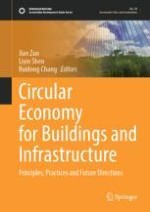2024 | OriginalPaper | Buchkapitel
10. Towards City 5.0: Building Resilient Communities Through the Interplay of Circular Economy, Resilient and Sustainable Supply Chains, and Reverse Logistics
verfasst von : Nicholas Chileshe, Larissa Statsenko, Ruchini Jayasinghe, Ethan Nikookar
Erschienen in: Circular Economy for Buildings and Infrastructure
Aktivieren Sie unsere intelligente Suche, um passende Fachinhalte oder Patente zu finden.
Wählen Sie Textabschnitte aus um mit Künstlicher Intelligenz passenden Patente zu finden. powered by
Markieren Sie Textabschnitte, um KI-gestützt weitere passende Inhalte zu finden. powered by
